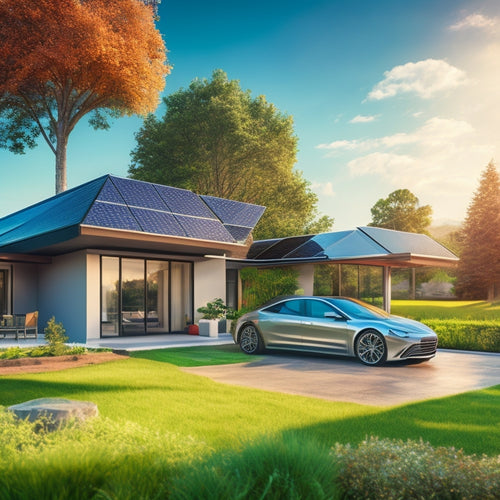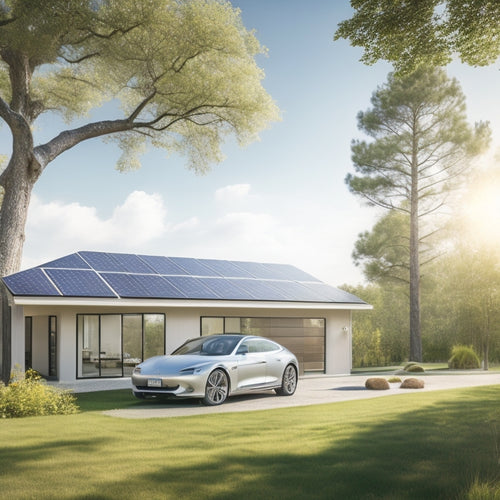
Affordable Electricity Cost Options Using Solar Panels
Share
You're looking for affordable electricity cost options using solar panels to reduce your energy bills and switch to renewable energy. Solar panels can be a cost-effective solution, but the upfront investment varies depending on panel type, quality, and efficiency, with installation costs ranging from $15,000 to $30,000 or more. However, you can offset these costs with federal tax credits, state rebates, and net metering. Additionally, solar panels can reduce your electricity bills by up to 50% during peak sunlight hours. By understanding your energy usage patterns and solar panel costs, you can make an informed decision about utilizing the power of solar energy to slash your costs - and there's more to investigate about how to make it work for you.
Key Takeaways
- Solar panels can reduce electricity bills by up to 50% during peak sunlight hours, providing an affordable electricity cost option.
- Federal tax credits and state government incentives can cover up to 26% of solar system costs, making it more affordable.
- Multiple payment plan options, including lease agreements and power purchase agreements, are available for financing solar systems.
- Conducting an energy audit and switching to energy-efficient appliances can help identify cost-cutting opportunities and reduce overall energy consumption.
- Long-term solar savings can increase property value, attract future buyers, and provide financial advantages that make solar investment worthwhile.
Understanding Solar Panel Costs
How much are you willing to invest in utilizing the power of the sun? When considering solar panel options, understanding the costs involved is essential.
You'll need to decide on the type of solar panel that suits your needs, as prices vary depending on the quality and efficiency of the panels. Installation costs will also depend on the system size, grid connection, and installation company.
Maintenance requirements are minimal, but regular cleaning and inspections are necessary to guarantee peak energy output. The environmental impact of solar panels is a significant advantage, as they produce clean energy with zero emissions.
Technological advancements have improved efficiency and reduced costs, making solar power more accessible. Warranty options typically range from 25 to 30 years, providing assurance on the performance of your system.
Financing options, such as loans and leasing, can help spread the initial investment over time. By understanding these costs and factors, you can make an informed decision about investing in solar power and start utilizing the energy of the sun.
Benefits of Renewable Energy
As you consider investing in solar panels, you'll benefit from a clean energy source that reduces your reliance on fossil fuels.
By switching to renewable energy, you'll markedly reduce your carbon footprint and contribute to a cleaner environment.
Additionally, you'll gain energy independence, freeing yourself from the volatility of traditional energy sources and their associated price fluctuations.
Clean Energy Source
Renewable energy sources, such as solar power, offer a cleaner alternative to fossil fuels, reducing your reliance on finite resources and mitigating the impact of climate change.
By utilizing the power of the sun, you can generate electricity while minimizing your carbon footprint. With advancements in solar technology, energy storage has become more efficient, allowing you to store excess energy generated during the day for use during the night or on cloudy days. This means you can enjoy a consistent and reliable source of clean energy.
Additionally, solar panels require minimal maintenance and can last for up to 30 years, making them a cost-effective option in the long run.
Reduces Carbon Footprint
By utilizing the power of solar energy, you greatly reduce your carbon footprint, directly contributing to a cleaner environment. This significant reduction in carbon emissions is an essential step towards mitigating the adverse environmental impact of traditional fossil fuels.
As you switch to solar power, you effectively offset the carbon emissions from your energy consumption, resulting in a substantial decrease in your overall carbon footprint.
The environmental impact of solar energy is negligible compared to traditional energy sources. Solar panels produce no emissions, noise, or pollution, making them an attractive option for those seeking to minimize their ecological footprint.
By choosing solar energy, you're not only reducing your reliance on fossil fuels but also contributing to a cleaner, healthier environment for future generations.
Your decision to adopt solar power has a direct positive impact on the environment. With solar energy, you're taking a proactive step towards reducing your carbon offset and promoting a sustainable future.
Energy Independence
Embracing solar energy enables you to break free from reliance on the grid, granting you control over your electricity costs and usage. This means you're no longer at the mercy of fluctuating energy prices or unexpected outages.
With solar autonomy, you're in charge of your energy needs, ensuring a stable and predictable electricity supply.
Solar panels allow you to generate your own clean energy, reducing your dependence on the grid. This grid independence gives you the freedom to make choices about your energy usage, rather than being bound by the limitations of traditional power sources.
You can monitor your energy production and consumption in real-time, making informed decisions about your energy needs.
Lowering Your Electricity Bills
About 85% of your monthly electricity bill stems from powering your home's appliances, lighting, and HVAC system.
To lower your electricity bills, you need to understand your energy usage patterns. By monitoring your energy consumption, you can identify areas where you can cut back and optimize your energy usage.
Here are some ways to reduce your electricity bills:
-
Conduct an energy audit: Hire a professional to assess your home's energy efficiency and identify areas of improvement.
-
Switch to energy-efficient appliances: Replace traditional incandescent bulbs with LED bulbs and use energy-efficient appliances to reduce your electricity usage.
-
Adjust your thermostat: Lower your thermostat in winter and raise it in summer to reduce your HVAC system's energy consumption.
- Turn off appliances on standby: Unplug appliances and electronics when not in use to eliminate standby power consumption.
Government Incentives for Solar
Since you're considering alternative energy sources to lower your electricity bills, you're likely aware that solar power can be a significant investment. However, you can reduce the upfront costs with government incentives.
The federal government offers tax credits of up to 26% of the total solar panel system cost. In addition, state governments provide rebates, which vary in amount. You may also be eligible for solar grants, installation incentives, and renewable energy certificates, which can be sold to utility companies.
Net metering allows you to generate your own electricity and export any excess to the grid, reducing your electricity bills. You can also consider solar leasing or community solar programs, which enable you to benefit from solar power without owning the system.
Moreover, many states exempt solar panel systems from property taxes, reducing your overall costs. Finally, the solar investment tax credit allows businesses and individuals to claim a credit against their tax liability.
Solar Panel System Financing
You're likely considering how to finance your solar panel system, and you have several payment plan options to choose from.
Understanding the upfront costs involved is essential in making an informed decision, as it can affect your overall return on investment.
Payment Plan Options
By now, you've likely realized that investing in a solar panel system can be a significant upfront cost. However, there are several payment plan options available to make solar energy more accessible.
You can evaluate the following financing options:
-
Lease Agreements: Pay a fixed monthly fee to use the solar panel system, with the option to purchase it at the end of the lease term.
-
Power Purchase Agreements: Buy the electricity generated by the solar panel system at a fixed rate, which is often lower than your current electricity rate.
-
Community Solar: Invest in a shared solar panel system with other individuals or organizations, and receive a proportionate amount of the electricity generated.
- Financing Options: Take advantage of installment plans, tax credits, and equipment warranties to reduce the upfront cost of purchasing a solar panel system.
These payment plan options can help you overcome the initial cost barrier and start enjoying the benefits of solar energy.
Additionally, you'll need to evaluate maintenance costs, grid connection fees, and performance guarantees when choosing a payment plan.
Upfront Costs Explained
With the various payment plan options in mind, it's essential to understand the upfront costs associated with solar panel system financing. When evaluating solar panels, you'll need to factor in the initial investment required to get your system up and running. This includes installation expenses, which can vary depending on the size and complexity of your system.
On average, the upfront cost of a solar panel system can range from $15,000 to $30,000 or more, depending on the quality and quantity of equipment needed.
Breaking down the upfront costs, you'll typically need to pay for the solar panels themselves, as well as the installation labor, mounting hardware, and electrical components. Additionally, you may need to take into account permits, inspections, and other miscellaneous fees.
While these costs may seem steep, they're a necessary part of utilizing the power of solar energy. By understanding these upfront costs, you can make an informed decision about whether solar panels are right for you and start enjoying the long-term benefits of renewable energy.
Comparing Solar Panel Prices
When researching affordable solar panel options, comparing solar panel prices is a crucial step in determining the best value for your investment.
You'll want to take into account the different types of solar panels, their efficiency, and the installation costs associated with each.
Here are some key factors to keep in mind when comparing solar panel prices:
-
Solar panel types: Monocrystalline, polycrystalline, and thin-film solar panels vary in efficiency and price. Monocrystalline panels are the most efficient but also the most expensive.
-
Installation costs: The cost of installation can vary depending on the complexity of the installation, the size of the system, and the installer's rates.
-
System size: The larger the system, the more panels you'll need, which can increase the overall cost.
- Warranty and maintenance: Look for panels with a good warranty and low maintenance costs to guarantee long-term savings.
Energy Efficiency at Home
You can greatly reduce your energy bills and carbon footprint by optimizing energy efficiency at home. Start by conducting an energy audit to identify areas of improvement.
Insulate your home to prevent heat loss and reduce heating costs. Upgrade to energy-efficient appliances and incorporate smart technology to optimize energy usage.
Consider renewable upgrades like solar panels or energy storage systems to reduce your reliance on the grid. Be mindful of peak hours and adjust your energy usage accordingly.
Use energy monitoring tools to track your consumption and identify opportunities for improvement. Implement load management strategies to shift non-essential loads to off-peak hours.
Develop sustainable habits like turning off lights and electronics when not in use. You can also make DIY improvements like sealing air leaks and installing low-flow fixtures.
Long-Term Solar Savings
Optimizing energy efficiency at home sets the stage for exploring alternative energy sources, and solar panels are an attractive option for reducing your reliance on the grid.
As you consider investing in solar panels, it's important to look at the long-term benefits and savings. Your solar investment will pay off in the long run, providing considerable financial advantages.
Here are some key long-term solar savings to expect:
-
Lower Electricity Bills: Solar panels can greatly reduce your electricity bills, especially during peak sunlight hours. You can save up to 50% on your monthly bills, depending on your energy usage.
-
Increased Property Value: Installing solar panels can increase your property value, making your home more attractive to potential buyers if you decide to sell in the future.
-
Government Incentives: You may be eligible for government incentives, such as tax credits, for investing in solar energy. These incentives can help offset the initial cost of your solar investment.
- Low Maintenance: Solar panels require minimal maintenance, which means you'll save on repair and replacement costs over the years.
Frequently Asked Questions
How Often Should I Clean My Solar Panels for Optimal Performance?
As you utilize the sun's energy, remember that dusty panels are like veils on a radiant face - they obscure the beauty of power. You should clean your solar panels every 6-12 months for best performance, ensuring panel maintenance is a priority in your cleaning frequency.
Can I Use Solar Panels to Charge My Electric Vehicle?
You can utilize solar power to charge your electric vehicle, experiencing EV benefits like reduced emissions and lower operating costs. With solar charging, you'll charge your car sustainably, maximizing your eco-friendly impact while saving on fuel expenses.
Do Solar Panels Work During a Power Outage?
You might wonder if solar panels work during a power outage; unfortunately, they don't unless you have a battery backup system, which guarantees continued power supply by storing excess energy and enhancing solar panel efficiency when the grid fails.
Can I Install Solar Panels on a Metal Roof?
You can install solar panels on a metal roof, leveraging its benefits like durability and water-tightness, but be prepared to overcome installation challenges like specialized mounting systems and potential corrosion issues.
Are Solar Panels Resistant to Hail and Extreme Weather?
You're wondering if solar panels can weather the storm, literally. Think of them as shields, deflecting hail damage and withstanding extreme conditions. Most panels are designed to resist impacts up to 1 inch in diameter, ensuring your power stays on.
Related Posts
-

What Solar Panels Work Best With EVS Online?
When shopping for solar panels online to power your electric vehicle, look for high-efficiency models that can withst...
-

Why Invest in Solar Car Battery Chargers Online?
By investing in a solar car battery charger online, you're not only reducing your reliance on fossil fuels but also o...
-

3 Best State and Local Solar Incentives USA
You can greatly reduce your energy dependence and save thousands of dollars by taking advantage of the top state and ...


